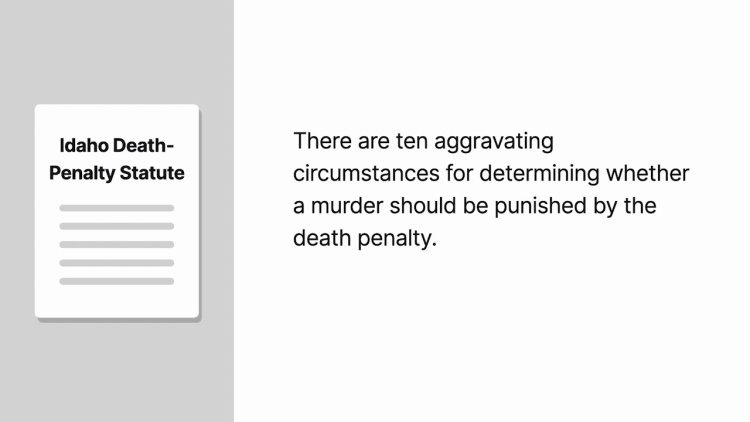Arave v. Creech
United States Supreme Court
507 U.S. 463, 113 S.Ct. 1534, 123 L.Ed.2d 188 (1993)
- Written by Samantha Arena, JD
Facts
Thomas Creech (defendant), an inmate already serving life sentences for numerous first-degree murders, killed fellow inmate David Jensen at the Idaho State Penitentiary. Creech gave conflicting accounts of the events, but the court found that Jensen approached Creech with a battery-filled sock, which Creech took and with which Creech struck Jensen in the head. After the struggle continued, Creech repeatedly kicked Jensen in the throat and head, even though Jensen was already helpless and badly injured. Jensen later died. Creech pleaded guilty to first-degree murder. The trial judge held a sentencing hearing and found that Creech was initially justified in protecting himself from Jensen’s attack, but Creech was completely in control after the attack began, and the murder itself was alarmingly violent, indicating severe rage. The judge found five aggravating circumstances present, including that Creech exhibited “utter disregard for human life,” and concluded that any mitigating circumstances did not outweigh the aggravating factors. Creech was sentenced to death. The Idaho Supreme Court affirmed, expressing that the limiting construction it had placed on the “utter disregard for human life” language in State v. Osborn, 631 P.2d 187 (1981), was adequate and concluding that the phrase is meant to refer to circumstances that exhibit “the highest, the utmost callous disregard for human life, i.e., the cold-blooded, pitiless slayer.” Creech filed a petition for a writ of habeas corpus in federal court. The United States Court of Appeals for the Ninth Circuit agreed with Creech that the “utter disregard” language was unconstitutionally vague.
Rule of Law
Issue
Holding and Reasoning (O’Connor, J.)
Dissent (Blackmun, J.)
What to do next…
Here's why 907,000 law students have relied on our case briefs:
- Written by law professors and practitioners, not other law students. 47,100 briefs, keyed to 996 casebooks. Top-notch customer support.
- The right amount of information, includes the facts, issues, rule of law, holding and reasoning, and any concurrences and dissents.
- Access in your classes, works on your mobile and tablet. Massive library of related video lessons and high quality multiple-choice questions.
- Easy to use, uniform format for every case brief. Written in plain English, not in legalese. Our briefs summarize and simplify; they don’t just repeat the court’s language.





